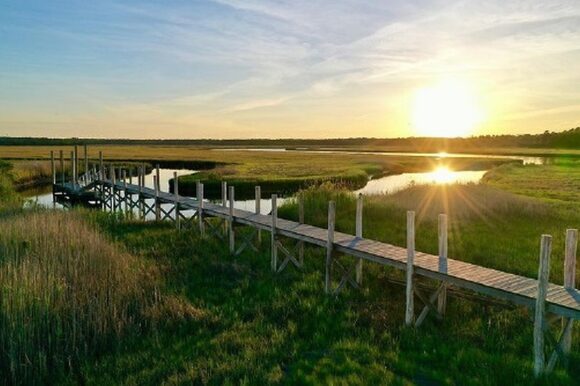
Greatbay-Mullica River Estuary. Photo: Rob Auermuller, Life on the Edge Drones.
The Jacques Cousteau National Estuarine Research Reserve (JC NERR) is working with a team from Rutgers University to develop a Resilience Checklist for New Jersey’s Commercial Fisheries to help fishing businesses evaluate and improve their preparedness for coastal hazards and fisheries changes. Funded by New Jersey Sea Grant Consortium, the project team includes members from the JC NERR, Rutgers Cooperative Extension, Rutgers Haskin Shellfish Research Laboratory, and Rutgers Walton Center for Remote Sensing and Spatial Analysis. The team adapted the Resilience Checklist from similar Fisheries Resilience Indices developed for use in Alaska and the Gulf of Mexico.
The Resilience Checklist builds on the JC NERR’s previous work to help coastal communities assess and improve their resilience to coastal hazards. The new tool allows New Jersey’s commercial fishing businesses to reflect on steps they have already taken to be resilient and to identify opportunities to further prepare for current and future risks associated with coastal hazards and changing fisheries dynamics. Although it can be used individually by one business or fisherman, it is most effective when completed collaboratively by several fishing businesses or fishermen from a New Jersey port or dock. The Resilience Checklist is intended to start conversation and coordination between dock managers, fishermen, processors, dealers, and others involved in the industry about planning and preparation to address vulnerabilities. Each section includes online resources that can be used to learn more and develop solutions to improve resilience
The checklist is organized into four sections to comprehensively address fishing business resilience:
- Assess Coastal Hazard Risks – Identify and understand the risks from coastal storms, flooding, and shoreline erosion.
- Prepare for Coastal Hazards – Develop a plan to prepare for the impacts of coastal storms, flooding, and shoreline erosion.
- Recover from Coastal Hazards – Identify proactive steps for speedier recovery after a coastal hazard event.
- Assess and Prepare for Fisheries Changes – Consider the impacts of potential shifts in fisheries resources and identify strategies to improve resilience.
In 2021, an initial draft of the Resilience Checklist was reviewed and tested by commercial fishing business stakeholders from four New Jersey fishing ports – Port Norris, Cape May, Barnegat Light, and Belford. The original scope of work for the project included in-person focus groups with fishing industry stakeholders at these ports; however, due to COVID-19 restrictions, the project team adapted a hybrid approach. Stakeholders provided input through a combination of written review and comments, virtual discussions, and outdoor small group meetings during the summer. The project team synthesized feedback and through an iterative process developed a revised version of the Resilience Checklist.
In early 2022, the revised Resilience Checklist was provided to marine fisheries managers for further review and input, and on March 18, the project team met with a small group to discuss their feedback and further improve the tool. This group included representatives from the National Oceanic and Atmospheric Administration, New Jersey Department of Environmental Protection, and Mid-Atlantic Fishery Management Council. The next step is to develop a final iteration of the Resilience Checklist based on the fisheries managers’ feedback. The project team is developing an outreach plan to disseminate the tool to fishing business stakeholders later this year.

